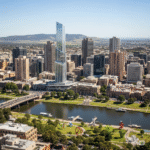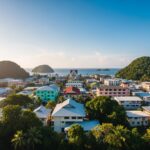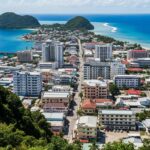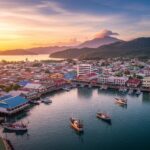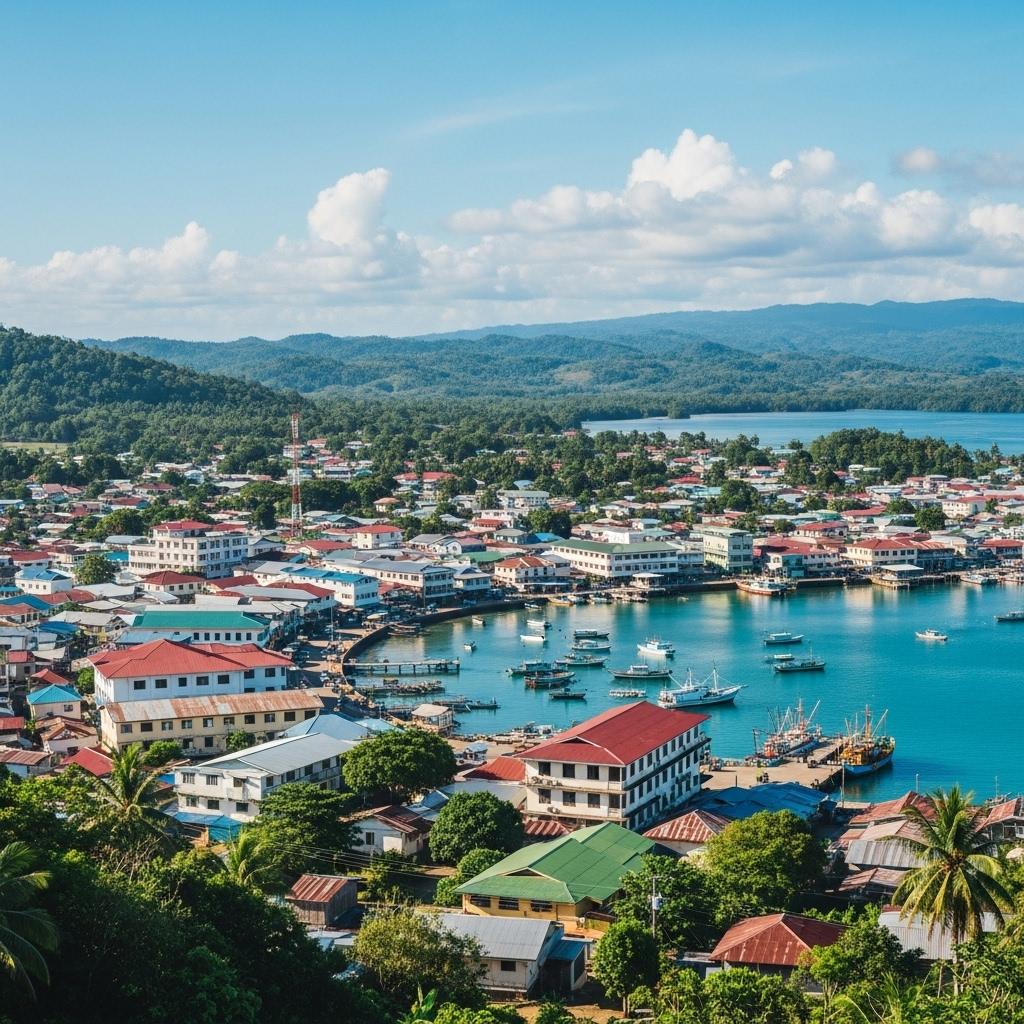
Planning Your Trip to Tulagi
Essential Information
Country and Province
Solomon Islands, Central Province
Timezone
GMT +11
Languages Spoken
Pijin, English, Local languages
Currency
Solomon Islands Dollar (SBD)
Weather and Climate
Monthly Snapshot
- January-April: Wet season, high humidity, average temperature 28°C (82°F)
- May-October: Dry season, less humid, average temperature 27°C (81°F)
- November-December: Transition period, increasing rainfall, average temperature 28°C (82°F)
Discovering Tulagi: An Island Overview
Tulagi, a former capital of the British Solomon Islands Protectorate, is a small island with a big story to tell. Nestled in the Central Province, this island offers a compelling mix of historical significance, breathtaking natural beauty, and authentic island charm. Easily explored on foot, Tulagi invites you to step back in time amidst WWII remnants, dive into vibrant coral reefs, and connect with the warm hospitality of the locals. It’s a peaceful escape, ideal for history enthusiasts, nature lovers, and anyone seeking a genuine island experience. The island has recovered since the war and is now a serene destination for all to enjoy.
Best Time to Visit Tulagi
Seasonal Considerations
- May-October (Dry Season): Pros – Lower humidity, less rainfall, perfect for diving and outdoor activities. Cons – Slightly cooler temperatures, potential for reduced visibility at some dive sites due to winds.
- November-April (Wet Season): Pros – Lush, green landscapes, calmer seas, fewer crowds. Cons – High humidity, possibility of heavy rainfall and cyclones.
Getting to Tulagi and Visa Information
Travel Logistics
- Flights: Arrive at Honiara International Airport (HIR) on Guadalcanal. Then, connect to Tulagi via domestic flight or ferry.
- Trains: N/A
- Visa Details: Most nationalities can enter the Solomon Islands visa-free for up to 90 days. Confirm the specific requirements for your nationality before traveling.
- Airport Transfers: Arrange boat transfers from Honiara to Tulagi. Some accommodations offer airport pickup from Honiara.
Tulagi’s History and Culture
Fun Historical Fact
During World War II, Tulagi was the location of the Battle of Tulagi and Gavutu-Tanambogo, a pivotal clash between Japanese and Allied forces in May 1942. This battle marked the first American amphibious landing against the Japanese and a key moment in the Pacific Theater. Sunken ships and wartime relics remain, drawing divers and history buffs alike.
Notable Figures
While Tulagi may not have many internationally recognized celebrities due to its size, many locals have significantly contributed to their community and country through their work in politics and the church.
Top 10 Attractions in Tulagi
- Tulagi WWII Relics: Explore bunkers, gun emplacements, and other wartime structures.
- Address: Scattered throughout Tulagi Island
- Sunken Ships: Dive or snorkel among sunken warships and cargo vessels, now home to diverse marine life.
- Address: Offshore of Tulagi Island
- Tulagi Harbor: Enjoy views, watch local boats, and experience island life.
- Address: Tulagi Waterfront
- Gavutu and Tanambogo Islands: Visit these islands, which saw heavy fighting during WWII.
- Address: Adjacent to Tulagi
- Local Markets: Immerse yourself in the local culture and find fresh produce and handicrafts.
- Address: Tulagi Town Center
- St. Mary’s Catholic Church: A historic church that has played a vital role in the community.
- Address: Tulagi
- Fishing: Charter a boat for a fishing trip in the waters around Tulagi.
- Address: Tulagi Harbor
- Snorkeling/Diving: Discover coral reefs and abundant marine life.
- Address: Offshore of Tulagi Island
- Nggela Islands: Boat trip to nearby islands known for beaches and traditional villages.
- Address: A short boat ride from Tulagi
- Mbonege Beach A quiet, sandy beach area for relaxing near the water.
- Address: Mbonege Beach
Tulagi’s Hidden Gems
- Secret WWII Tunnels: Find hidden tunnels and bunkers from WWII.
- Address: Requires local guide to locate
- Local Village Visits: Experience the traditional way of life in a nearby village.
- Address: Requires local guide to arrange
- Birdwatching: Spot unique bird species in the island’s lush vegetation.
- Address: Various locations throughout the island
Local Festivals and Events
- Solomon Islands Independence Day (July 7th): Celebrations with parades, dances, and cultural performances throughout the country.
- Local Church Celebrations: Check for local church events featuring traditional music and dance.
Day Trips from Tulagi
- Honiara (Guadalcanal): Visit the capital for historical sites and markets.
- Nggela Islands: Short boat ride to beaches and snorkeling spots.
Photography and Instagram-Worthy Locations
- Tulagi Harbor at Sunset: Capture the sunset.
- Sunken Ships: Photograph the beauty of the sunken ships.
- Local Markets: Capture the atmosphere of the local markets.
- Underwater Reefs: Get a good shot of the sea life.
Accommodation and Getting Around
Recommended Stay
3-5 days
Where to Stay (By Budget)
Budget
- Tulagi Dive Resort
- Address: Tulagi, Solomon Islands
Mid-Range
- Raiders Hotel
- Address: Tulagi, Solomon Islands
Luxury
- (Luxury options are limited on Tulagi; consider staying in Honiara and taking day trips)
Transportation
- Public Transport: Limited.
- Taxis: Limited; arrange transportation with your hotel.
- Walking: Tulagi is easily walkable.
- Boats: Essential for traveling between islands.
Preparing for Your Trip
Packing Essentials
- Lightweight clothing
- Swimwear
- Reef-safe sunscreen
- Insect repellent
- Hat and sunglasses
- Comfortable walking shoes
- Rain jacket
- Underwater camera (optional)
Useful Apps
- Maps.me (for offline navigation)
- Google Translate
Safety and Etiquette
- Do’s:
- Respect local customs.
- Ask permission before taking photos.
- Learn basic Pijin phrases.
- Don’ts:
- Avoid walking alone at night.
- Don’t display excessive wealth.
- Scams to avoid: Be cautious of unsolicited offers.
- Respectful behavior: Dress modestly in villages and churches; respect elders.
Food, Fun, and Souvenirs
Top Restaurants
- Explore local eateries for fresh seafood and traditional dishes. Ask locals for recommendations.
Must-Try Dishes
- Poi: Traditional taro dish.
- Fresh Seafood: Grilled fish, lobster, and other seafood.
- Cassava Bread: A bread made from cassava.
Nightlife and Entertainment
- Nightlife is limited. Enjoy quiet evenings or socialize at local bars.
What to Buy
- Wood Carvings: Depicting legends and wildlife.
- Shell Jewelry: Made from seashells.
- Handwoven Baskets: Traditional baskets.

